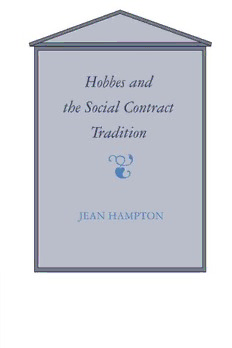
Hobbes and the Social Contract Tradition PDF
Preview Hobbes and the Social Contract Tradition
In Leviathan Hobbes mounted a famous, or notorious, argument for the creation and maintenance of an absolute sovereign as the means to secure peace. He postulated a "state of nature" in which people would find themselves unable to cooperate or keep contracts without government, but argued that these people would be able to keep a social contract among themselves creating a ruler, and that it was in their self-interest to create only a ruler with absolute power. Both problematic and influential, this justification for the state is the subject of the present book. Professor Hampton presents a new and comprehensive analysis of Hobbes's argument that draws on recent developments in game and decision theory to establish whether the argument does, or can be made to, succeed. She generalizes her findings to exhibit the structure of any social contract argument, showing its strategy for justifying the state and for explaining the state's structure. Lucidly written throughout, this book will interest students of Hobbes's theory, and of the social contract tradition in political thought. HOBBES AND THE SOCIAL CONTRACT TRADITION Hobbes and the Social Contract Tradition JEAN HAMPTON CAMBRIDGE UNIVERSITY PRESS CAMBRIDGE UNIVERSITY PRESS Cambridge, New York, Melbourne, Madrid, Cape Town, Singapore, Sao Paulo, Delhi, Dubai, Tokyo, Mexico City Cambridge University Press The Edinburgh Building, Cambridge CB2 8RU, UK Published in the United States of America by Cambridge University Press, New York www.cambridge.org Information on this title: www.cambridge.org/9780521368278 © Cambridge University Press 1986 This publication is in copyright. Subject to statutory exception and to the provisions of relevant collective licensing agreements, no reproduction of any part may take place without the written permission of Cambridge University Press. First published 1986 First paperback edition 1988 Reprinted 1990,1995 A catalogue record for this publication is available from the British Library Library of Congress Cataloguing in Publication Data ISBN 978-0-521-26184-8 Hardback ISBN 978-0-521-36827-8 Paperback Cambridge University Press has no responsibility for the persistence or accuracy of URLs for external or third-party internet websites referred to in this publication, and does not guarantee that any content on such websites is, or will remain, accurate or appropriate. Information regarding prices, travel timetables, and other factual information given in this work is correct at the time of first printing but Cambridge University Press does not guarantee the accuracy of such information thereafter. TO RICHARD Contents Acknowledgments page ix A note on texts and references xi Introduction i 1 "Of Man": the foundation of Hobbes's political argument 5 1.1 The premisses of Hobbes's argument 5 1.2 Hobbes's radical individualism 6 1.3 Hobbes's materialist psychology 11 1.4 Human equality 24 1.5 Hobbes's ethics 27 2 What is the cause of conflict in the state of nature? 58 2.1 The rationality account of conflict 58 2.2 The passions account of conflict 63 2.3 Evaluating the two accounts 68 2.4 Problems with the passions account of conflict 69 2.5 Problems with the rationality account of conflict 74 2.6 Summary 79 3 The shortsightedness account of conflict and the laws of nature 80 3.1 Conflict arising because of shortsighted pursuit of self-preservation 80 3.2 Review of the shortsightedness account of conflict 88 3.3 The laws of nature 89 3.4 Hobbes's science of moral philosophy reexamined 92 3.5 God and the laws of nature 94 4 The argument for absolute sovereignty 97 4.1 Hobbes's regress argument for absolute sovereignty 98 4.2 Can absolute sovereignty be invested in all or some of the people? 105 4.3 Hobbes's legal positivism 107 4.4 The historical context of the regress argument no vii
